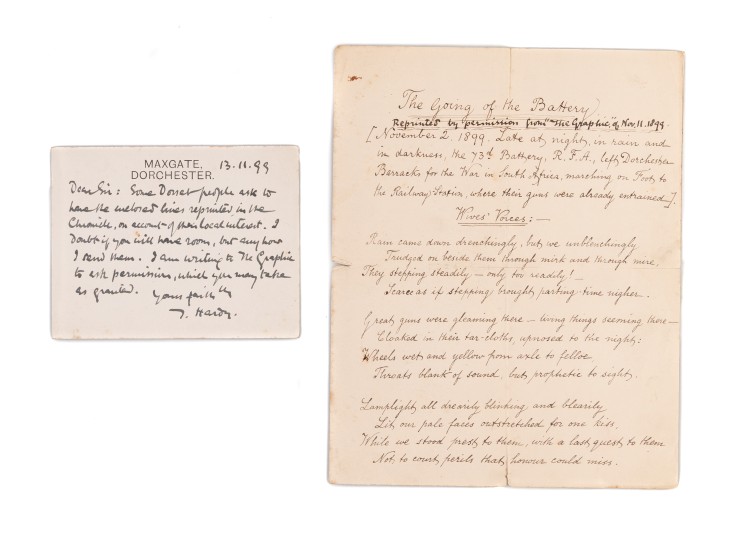Sam Johnston, Service Manager for Archives, writes: Thomas Hardy, Dorset’s literary icon, is one of the nation’s most recognisable and well-loved novelists. This collection was acquired to complement the principal Hardy archive, which is now on deposit at Dorset History Centre. It represents a major addition to the publicly-accessible Hardy archives and provides a fascinating insight into Hardy’s professional circle, his personal circumstances and his views and beliefs on a range of subjects.
The material is made up of 46 separate elements, some of which contain multiple items. The bulk of the material was acquired between 1920 and 1970 and held as a single collection until this sale.
The collection illustrates the life and connections of Hardy. It ranges from his youth in the middle of the 19th century to the years just after his burial in 1928. There are family items – two schoolbooks used by his brother Henry and sister Katherine and Thomas Hardy’s own manuscript design for a memorial to his father as well as other personal items.
Secondly, there are books, some used by Hardy – in particular the annotated Latin text of Horace which he owned by 1860 at the latest. Hardy has underlined the text “Concurritur: horae momento cita mors venit, aut Victoria laeta” or “The fight begins: on the instant comes swift death or joyous victory”. Hardy used this quotation as the title of chapter 53 of Far from the Madding Crowd. There are also volumes from Hardy’s Max Gate library, including his copy of ‘A Village Tragedy’ by Margaret Woods. Several of the volumes have presentation inscriptions, including one from Siegfried Sassoon. Hardy’s own copy of Pouncy’s Dorsetshire Photographically Illustrated is included. Pouncy was a notable photographer who, through his work, documented many of the locations that Hardy featured in his novels.
Thirdly, there are letters from Hardy – to editors, a tenant (apologising for the poor state of repair the rented property had fallen into), local historians, and friends. Several are important expressions of Hardy’s views, for example, his concern for the welfare of animals. Another decries the ‘fake’ opinions ascribed to him in a made-up newspaper interview. There are also numerous letters from his second wife, Florence Dugdale, and a poem that Hardy penned relating to the embarkation of soldiers for service in the Boer War, “The Going of the Battery”.
Fourthly, there are typescripts: Thomas Hardy’s speech delivered at a school named after his ancestor with manuscript insertions by him regarding his ancestors, the Hardye family, in Dorset in the 16th century. There are also the proofs of a story by Florence Dugdale about Blue Jimmy (a thief hanged at Ilchester Gaol) with manuscript insertions by Hardy.
The collection is a true miscellany; the result of a collector’s fascination with Hardy, appealing both because of its eclecticism but also the light it sheds upon Hardy, demonstrating his importance both to Dorset, but also the wider world.
Dorset History Centre would like to express its gratitude for the vital support provided by FNL without which this purchase would not have been possible.
